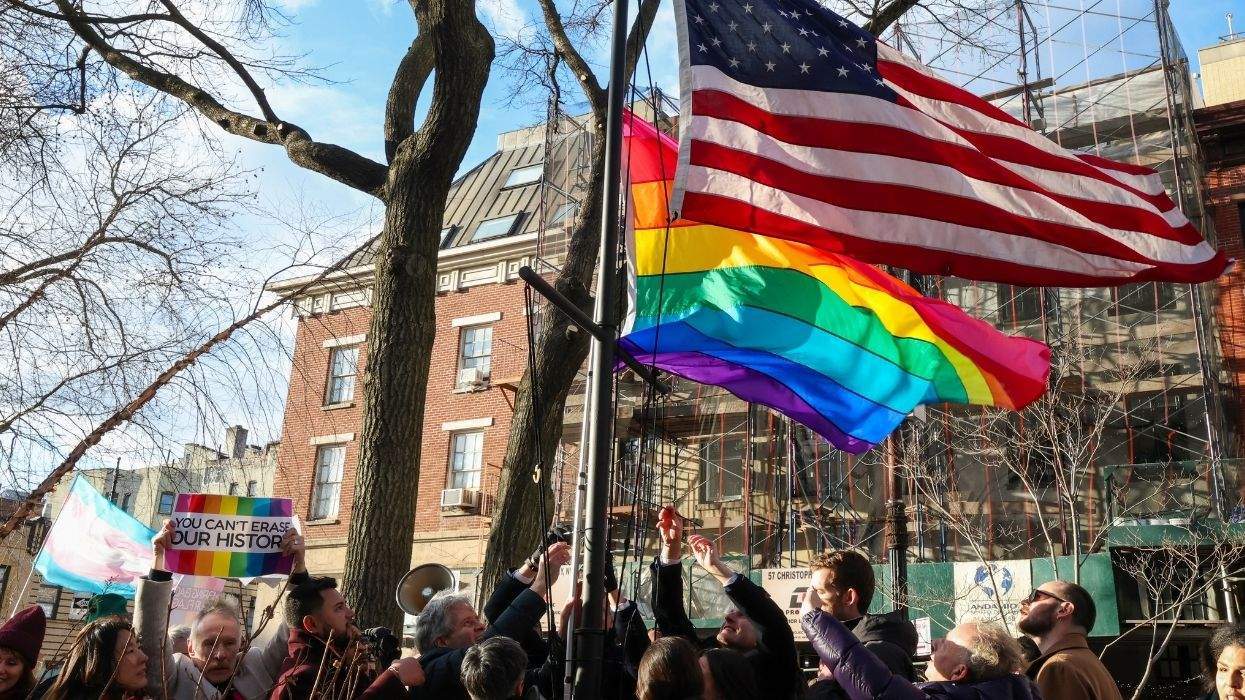Donald Trump and his Justice Department may argue that current federal law doesn't ban anti-LGBTQ discrimination, but many members of Trump's party disagree.
More than 30 well-known current and former Republicans have filed a friend-of-the-court brief in the employment discrimination cases the U.S. Supreme Court will hear October 8, The New York Times reports. The court will consider the cases of two men who say they were fired for being gay and a woman who was fired for being transgender, and the signatories to the brief contend that those actions are illegal.
Lower courts have found that such discrimination violates the Civil Rights Act of 1964, holding that the act's Title VII, banning sex discrimination, applies to discrimination based on sexual orientation and gender identity. The lawyers representing the employers have contested that interpretation and appealed the rulings to the Supreme Court.
The Republicans signing on to the brief, to be filed with the court this week, are led by Ken Mehlman, former chairman of the Republican National Committee and George W. Bush's 2004 campaign manager. Mehlman came out as gay in 2010 and became an activist for marriage equality.
Other signatories include several former members of the U.S. House of Representatives, such as Ileana Ros-Lehtinen, Tom Campbell, Ryan Costello, and Christopher Shays; former U.S. Sen. Alan Simpson; Meg Whitman, the president and CEO of eBay and 2010 California gubernatorial nominee; 2012 presidential candidate Fred Karger; and staffers from the George W. Bush administration.
Numerous other friend-of-the-court briefs regarding these cases are expected to be filed this week; the deadline is Wednesday. More than 150 Democrats in Congress, led by Rep. David Cicilline and Sen. Jeff Merkley, are also filing a brief supporting this interpretation of Title VII. But the Republican brief, which is not endorsed by any current members of Congress, is more surprising.
The Republicans' document calls for for an expansive reading of the civil rights law but does so using a conservative legal argument -- one derived in part from the writings of the late Supreme Court Justice Antonin Scalia, certainly no supporter of LGBTQ equality. It quotes from a book by Scalia and Bryan Garner, saying, "The text [of a law] plainly applies or does not apply by its very words," even if the legislators who crafted the law did not foresee a "particular circumstance" in which it would apply.
The text of Title VII, the brief says, makes clear that "it is unlawful for an employee's sex to contribute to an employer's decision to discharge or otherwise discriminate against the employee. Yet that is exactly what happened in all three cases on review. Two men were discharged because they were gay, which necessarily means that they lost their jobs because they were men who were attracted to men. Had they been similarly situated women -- that is, women who were attracted to men -- their employers would not have discharged them for such attraction.
"The other plaintiff is a transgender woman whose employer discharged her for representing herself as the woman she understood herself to be. The employer so acted because the employee declined to accede to the demand that employees who had been assigned 'male' at birth (or whom the employer otherwise believed to be male in essence) refrain from representing themselves as women. Had the plaintiff been assigned female at birth (or had the employer otherwise believed her to be female in essence), she would not have been discharged for representing herself as a woman. Thus, in all three cases, an employee was fired for attractions or actions that his or her employer would have tolerated for members of another sex. Plainly, the employees were discharged because of their sex. These are straightforward violations of the plain words of Title VII."
The brief acknowledges that in 1964, Congress and the American public may not have envisioned the term "sex" applying to sexual orientation or gender identity, but argues that this is not relevant. "As this Court has repeatedly recognized, in Title VII cases as well as cases in other areas of the law, statutes often apply more broadly than their drafters anticipated, and extrinsic evidence of statutory 'intent' is irrelevant when the statute's words are clear," it states.
The Trump administration, through the Department of Justice, has argued that Title VII does not apply to sexual orientation or gender identity. In October, Solicitor General Noel Francisco, whose position is part of the Justice Department, filed a brief with the Supreme Court regarding the transgender case, saying that lower courts had "misread" Title VII, as when it was enacted, "'sex' meant biological sex." The administration has also argued that Title VII does not apply to discrimination based on sexual orientation.
The Equality Act, pending in Congress, would amend the Civil Rights Act and several other federal laws to ban discrimination based on sexual orientation and gender identity, so the matter would no longer depend on courts' interpretation. The House approved the Equality Act in May, with support mostly from Democrats. Whether it will even come to a vote in the Republican-controlled Senate is doubtful. Trump is on record as opposing the bill.
The Democrats' brief was spearheaded by the two chief sponsors of the Equality Act, Cicilline and Merkley. "Title VII prohibits sex-based discrimination, and it is impossible to divorce an employee's sexual orientation or gender identity from their sex," their brief says. "Thus, discrimination on all bases that are related to a person's sex, including sexual orientation, gender identity and nonconformance with sex stereotypes, is prohibited."
The cases before the Supreme Court involve Donald Zarda, a New York skydiving instructor who said he was fired for being gay, although his employer gave another reason (Zarda is now deceased, but his estate has continued to pursue the case); Georgia social worker Gerald Bostock, also reportedly fired for being gay; and Aimee Stephens, a Michigan funeral director fired because she is transgender. The owner of her company has argued that she violated the corporate dress code by wearing women's clothing and also defended the dismissal based on his religious beliefs about the immutability of gender. The court has scheduled oral arguments for October 8 and is expected to rule by June of next year.
Mehlman also had an op-ed published in today's Times arguing that these people suffered unlawful discrimination. "Such treatment is unethical and un-American, and the Supreme Court has the opportunity to read the clear language of Title VII and affirm that it is illegal," he wrote. "No matter whether the justices take a textualist or practical interpretation, the answer is the same. ... No matter political party or personal beliefs, treating everyone fairly is something we can all get behind."















